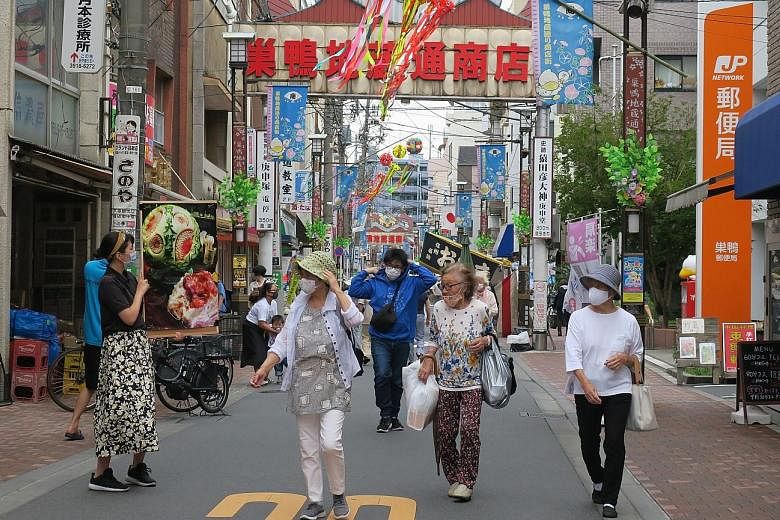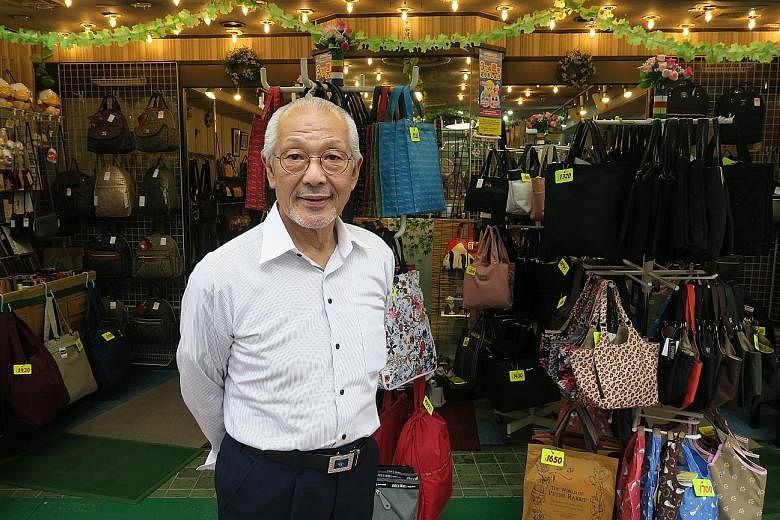Harajuku is renowned as Tokyo's mecca for outlandish youth culture, but over in the city's north-west is a district called Sugamo that has come to be affectionately known as "Harajuku for Grandmas".
The label has stuck since 1987, when it was first given in a news story, but residents admit that Sugamo, located two stops away from busy commuter hub Ikebukuro, is struggling to replicate its heady past in the late 1980s and 1990s, when as many as 100,000 people would throng it on festival days.
The Sugamo Jizodori Shopping Street - pivotal during the Edo era (1603-1868) as a pit stop on the route connecting Edo (now Tokyo) to the ancient capital of Kyoto - is home to the Koganji Temple, which holds a festival to celebrate a deity that is said to heal ailments.
"The resemblance to Harajuku was uncanny," Mr Shigeo Kizaki, 72, director of the shopping street's promotion association, told The Sunday Times.
He added: "It used to be so crowded that visitors, with barely any room to move, would walk shoulder to shoulder, with a row of shops on each side."
Sugamo's decline, however, began years ago, well before the Covid-19 pandemic, which has rendered it socially irresponsible - if not impossible in Japan - to hold festivals on their usual scale.
Mr Tetsu Kobayashi, 52, third-generation owner of an umbrella business and a lifelong resident in Sugamo, reminisced about how senior citizens used to visit wearing kimonos of flashy colours. Now, about 15,000 people visit the street on a good day, he said.
What has happened in Sugamo is a microcosm of the challenges faced by rural regions across Japan, which are finding it hard to sustain traditional festivals given their rapidly declining populations.
Ironically, in an ageing society, Sugamo is struggling to remain relevant to the very demographic that it was once attractive to.
Mr Kizaki, who runs a business selling bags dating to 1907, said one reason for Sugamo's decline was the changing complexion of the shopping street - one that he fears will be hastened by the pandemic.
The 800m shopping street was once full of decades-old mom-and-pop businesses selling traditional items at modest prices, he said, lamenting that these now form less than half of the 200 or so shops.
But family businesses have been closing amid a struggle to find successors, a trend worsened by Covid-19 that counts among its victims a Chinese restaurant known as Sugamo-en which closed in June after more than 90 years of history.
Taking their place are run-of-the-mill outfits like Tully's Coffee and bubble tea shops, popular among youth, Mr Kizaki noted.
A visitor in her 80s, who gave her name as Ms Miyashita, said that the new shops were a double-edged sword: While they are good for drawing youth, they hurt the nostalgic Edo-era atmosphere.
Mr Kizaki said his business is hanging on by a thread, with sales having plunged 90 per cent in the last quarter. Mr Kobayashi, meanwhile, is unsure if his undergraduate son, who is majoring in foreign policy, will take over.
But Sugamo can take heart in people like Mr Yuki Shiobara, 37, a music graduate who took over his family business selling tea, Yamane-en, six years ago. He believes there is plenty of potential for the shopping street to thrive, with better marketing and efforts to protect the friendly Edo-era atmosphere.
"It is unique not only to Japan, but also to the world, to have a street so dedicated to senior citizens," he said, noting one positive change to welcome the elderly: Unlike much of Tokyo, the street is barrier-free.


